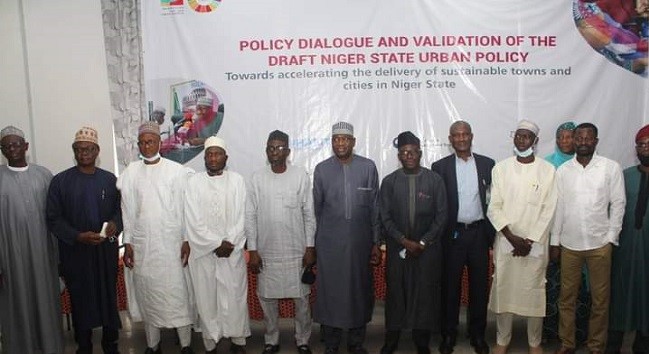The Niger State Government of Nigeria and stakeholders on Thursday, November 26, 2020 dialogued on the draft state Urban Policy aimed at developing the human settlements sector in an integrated manner.

In his address, Alhaji Ahmed Matane, Secretary to the Niger State Government, said that Gov. Abubakar Bello had spent the last two years to develop the Niger State Urban Policy based on the National Urban Policy of 2012.
The objectives of the policy dialogue is to give stakeholders the opportunity to validate the content of the draft policy.
Matane explained that the process of preparing the draft policy was bottom-up, stakeholders-driven and provided the opportunity for effective contribution to the collection of data that forms the basis of the policy.
“Town hall meetings were organised to build consensus among residents of local governments on their development challenges, hopes and aspirations,” he said.
He expressed optimism that the new state urban policy would facilitate a profound paradigm shift that builds good understanding, mutual respect and sustainable partnership between state, local governments and residents of villages, towns and cities.
He noted that the policy would enable them to demonstrate local ownership and contribute resources to pay their equitable share of cost of service.
Matane added that it would enable towns and cities to rearrange their financing, management and governance to enable them provide their residents infrastructure facilities and services on a self-sustaining basis.
In his remarks, Prof. Mustapha Zubairu, Coordinator, Niger State Urban Support Programme (SUP), disclosed that Niger was the first state to formulate the state urban policy in Nigeria and in Africa.
He explained that the state was getting a grant from South Korea government for the project and technical support from UN-Habitat, adding that the dialogue was to validate and see if the policy had captured and addressed people’s aspirations and hopes.
Zubairu disclosed the policy formulation was at its final stage, adding that a final version would be presented to the state Executive Council for consideration and approval and then presented to the state House of Assembly to be enacted into law.
Also, Dr Remy Sietichipin, Chief Policy Legislation and Governance Section, UN-Habibtat through a video call, said Niger was the first state to develop urban policy and advised the government and participants to ensure its implementation.
Similarly, Maj.-Gen. Lee Intae, South Korean Ambassador to Nigeria, in a video call, advised Niger State Government to take lesson from South Korea to help improve the living condition of the people.
In his presentation on Urban Policy Process in Niger, Mr Emmanuel Adeleke, Consultant with UN-Habitat Supporting the Implementation of the Policy, said the policy processes were feasibility and diagnosis.
Others were the implementation, monitoring and evaluation, participation, and capacity development.
One of the participants, Dr Bashir Yankuzo, Chief Imam of Federal University of Technology Minna, said that religious and traditional leaders should be involved in the implementation of the policy.
“There are certain good policies that are rejected by the people if they don’t have a clear picture of them based on religious sentiment and traditional taboo, it will then be their leaders that will educate them on the benefits of the policy,” he said.
By Rita Iliya
